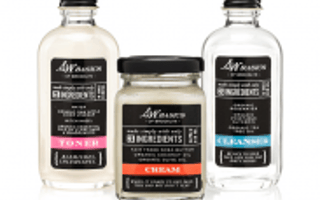Health and beauty companies are having a moment. The industry has traditionally been dominated by large players like Covergirl and Maybelline but more recently, the conversation around beauty has shifted. New companies, like S.W. Basics of Brooklyn and the Yes To brands, are leading the charge to help the beauty industry become more authentic, approachable and natural.
We spoke with Adina Grigore, founder of S.W. Basics of Brooklyn, about how catering to a unique beauty audience helped grow their business. Through a new approach to beauty, an authentic brand voice and relationship with consumers, and finding the right suppliers and distributors S.W. Basics has been able to grow from humble Brooklyn beginnings to being featured as one of Target’s Made to Matter brands. Throughout it all, Adina even found the time to write her first book, Skin Cleanse, as well as contribute articles to Entrepreneur.com.
A Basic Approach to Beauty
A lot of beauty brands are extreme. Either extremely natural, to the point where they can make people feel like they have to fit a certain stereotype in order to shop with them, or extremely large, huge corporations that aren’t speaking directly to women but instead trying to portray what women are expected to want out of a beauty product.
“I got really interested in beauty because I felt like a lot of what was happening in the industry is either kind of gross or boring,” laughs Adina.
With a background in holistic nutrition and personal training, Adina had unique experience in the wellness arena but not the business world. She started the brand with an Etsy store and began teaching skincare workshops, teaching people how to make products using the same formulas that S.W. Basics sells today. Because all the formulas are five ingredients or less, Adina thought it would be something people would want to learn how to do on their own.
“We discovered very quickly that it was not something people wanted to do on their own,” she laughs. “People like the DIY concept just as much as I do, but they don’t want to make them just as much as I don’t want to make them, which totally makes sense to me.”
Pivoting from her original plan, Adina started selling the skincare products, including face cleanser, toner and makeup remover, locally at markets in Brooklyn to gauge interest.
“From day one it just kind of took off,” Adina shares. “It of course feels like a very painful and slow growth, but it’s been pretty fast. I launched in on Esty in 2009, we went to our first trade show in 2011 and then this year I have a book coming out and we’re launching in Target! So I guess you would say that’s pretty fast.”
Creating an Authentic Brand Voice
[ibimage==47409==Original==none==self==null]
When launching S.W. Basics, Adina put a lot of thought into how the brand would be marketed and how to best express the differences between their brand and most other beauty brands on the market. They chose to focus on three key messages when marketing the brand. First, is no frills. S.W. Basics is big on providing women with beauty products that are easy to use and essential to your beauty routine.
“We’re not a beauty brand that is meant to feel super luxurious or super expensive. We don’t use exotic ingredients or fancy botanicals. We’re really pushing the idea of ‘this is meant to be your basics’ which is why we put it in the name. It’s the most important part,” explains Adina. “If you want to add other things to your routine that’s great, but we’re not here to provide that for you. We’re here to provide basic, simple products.”
Secondly, it was important for the brand to seem really approachable. There are no hidden, mysterious executives hiding behind ads of beautiful women. As a company with roots in the DIY movement, it was important to Adina to be open with their customers. They do this through blogging, social media, email marketing and the tone of their website.
“What I mean is, we do a lot of work to have people hear our voices in the brand. We’re going to constantly be as transparent as possible about every single piece of the company,” Adina continues. “I answer customer emails all the time. Everyone from the team blogs all the time. It’s really about people getting to know us.”
Lastly, Adina makes sure the brand stays lighthearted across all their marketing channels. While the brand places a high emphasis on being organic and all natural, they don’t want women to come to their website and feel terrified of chemicals or like they have to throw everything out and start over. S.W. Basics believes beauty should be fun and exciting, and wants to show consumers that they shouldn’t feel afraid to go outside without a full face of makeup on.
“I think the beauty industry takes itself super, super seriously and I think that’s really detrimental to women. You feel like if you don’t start applying anti-aging serums when you’re 25 then you’re going to have wrinkles,” she says. “So we’re really trying to say, no that’s not true. The products will not change your life – no products will change your life – you’re great the way you are and it’s not that big of a deal.”
All of these marketing messages are equally important and challenging because they are so different from the way most people are used to interacting with beauty companies.
“We exist in a conversation that has been going on for so long that I think we’ve sort of accepted that we’re going to have to chip away at it. We’re not going to revolutionize the whole thing over night. Even though that’s what I want,” laughs Adina.
Finding Organic & Fair Trade Manufacturers & Suppliers
[ibimage==47412==Large==none==self==null]
The S.W. Basics products started out as handmade, and eventually moved to a manufacturing facility. The company takes a lot of pride in being local and organic, and are taking steps to becoming organic certified. When you make the move from handmade to manufacturing, the high minimums required mean that you have to be ready to stomach a large bill. When you couple that with finding suppliers and manufacturers that meet the high standards set by S.W. Basics, it can be quite tough to transition your business model.
“First we went to places and negotiated with manufacturers to get them to lower their minimums. Then we ordered a little bit at a time, but only of our best sellers,” Adina explains. “But now, largely thanks to Target, we have been able to go to full-scale, organic manufacturers and be a good customer rather than someone that they want to kill,” she laughs.
Adina stresses the importance of learning a painful lesson when it comes to moving to manufacturing and fulfillment: don’t push your company to grow to the point where you feel like you’re splitting at the seams.
“We’ve waited until the absolute last second to scale. We didn’t move to manufacturing until we knew for sure that we needed the amount of inventory we were ordering. We didn’t move to a fulfillment center until we realized we physically do not have the amount of time we need to pack all of our orders,” Adina explains.
While what works for one company doesn’t always work for everyone, Adina explains that this process helped save them significant money and made the brand more enticing to investors. It can be very hard to be patient, especially when you have money coming in, but that restraint is sure to be beneficial in the long term.
Because of the restrictions surrounding being an organic certified, it was harder for S.W. Basics to find manufacturing facilities and suppliers that were up to their standards. Until this year, the team had been going to trade shows, looking online and calling individual facilities to make connections. They also recommend using the Fair Trade Organization and looking through websites that list suppliers of organic ingredients.
“We’ve probably met with 20 different places and gone through the whole process of getting to know them, going to meet with them, sitting and talking to them and trying to explain what we’re doing. And then realizing that they’re just not as natural as we want them to be. It’s been very, very hard,” Adina says.
Luckily, through trade shows and their network of wholesalers and fellow organic brands, S.W. Basics secured a few manufacturers across the country who are organic certified and willing to work with natural brands. They also work with a B Corp warehouse in North Carolina that solely focuses on fulfillment. Adina chose to go this route in a large part based upon their volume of eCommerce orders.
“It’s really, really important to us that a customer who comes on our site and is willing to spend money on our product gets a box that reflects how much we appreciate them. We really wanted a facility that understood how important these online orders were and this one was highly recommended to us,” she explains.
Finding the right suppliers, and making sure you have ingredients that meet regulations, especially if you’re working internationally, is a big challenge involved lots and lots of research. Now that S.W. Basics has found organic certified manufacturers, they’re significantly more well prepared to assist with finding sources for organic ingredients.
“We’ve had some farmers who’ve dropped off because they couldn’t keep up with the pace, but we’ve just transitioned to other places and farms that are equipped,” Adina explains.
However, once businesses reach a certain level of production it can become more than the supply chain can manage. When you’re in consumables, you do reach the point where you actually can’t find enough of a certain ingredient. At that point, it becomes a different sort of stressor. S.W. Basics isn’t yet at that point, but they welcome that new challenge when it arrives.
Becoming a Made to Matter Brand
[ibimage==47413==Large==none==self==null]
In early 2015, S.W. Basics persistence and patience paid off and expanded to their biggest retailer yet: Target. Through a retailer that carries S.W. Basics, they were invited to a beauty event put on by Target with the goal of finding new brands to bring into stores. Adina and her team visited Target’s headquarters to pitch the S.W. Basics brand.
“They were really responsive and really excited about the brands. We had a bunch of follow up meetings and it’s all gone very swiftly and it’s all been insanely overwhelming and exciting,” Adina shares.
Around the same time, one of Adina’s workshop clients, who happened to also be a book agent, approached her with the idea of putting together a proposal based on her workshops and the S.W. Basics products.
“I make this all sound like it was very easy and it’s been insanely hard,” laughs Adina.
After completing the proposal, the book was picked up by the team at Harper Wave, under the Harper Collins umbrella. After a year of working on the book, Skin Cleanse is now available for purchase.
“It’s been very much a labor of love, very much me just learning,” Adina concludes. “We started out handmade, now we manufacture. We’re getting organic certified. We’re very much in the thick of learning how to scale and grow.”






